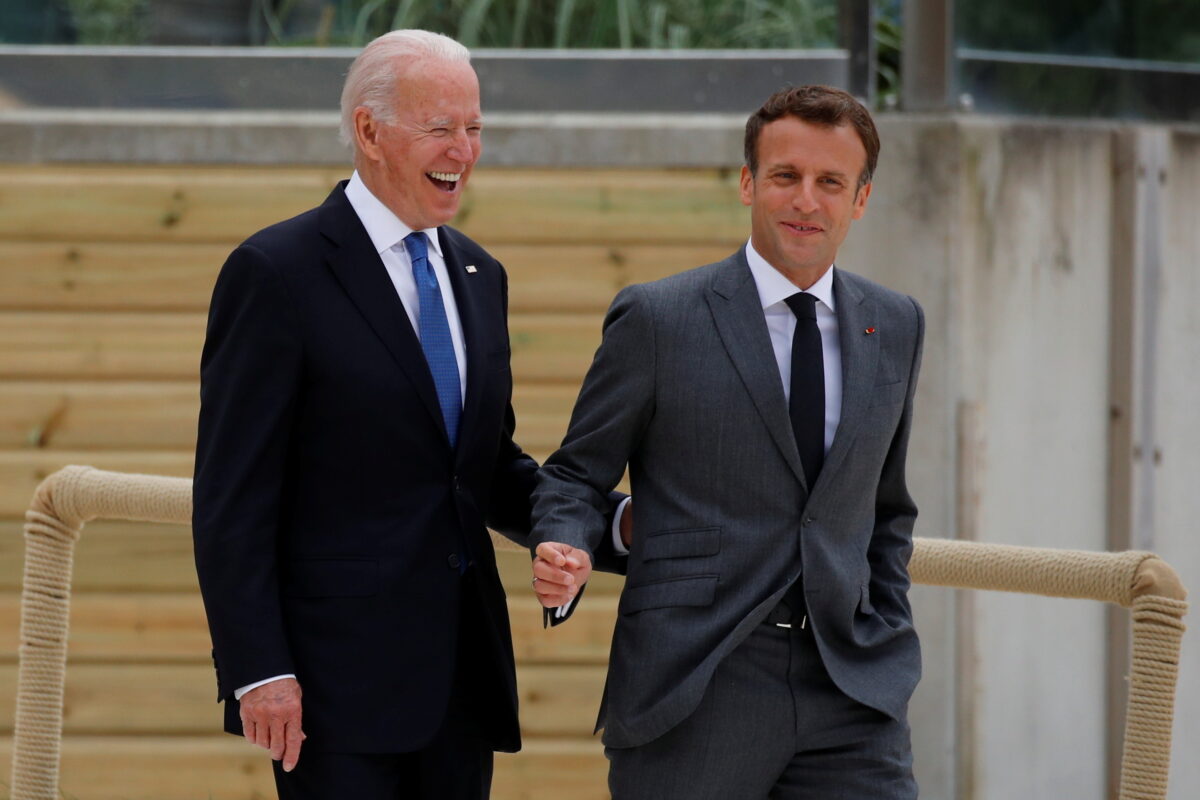Diplomatic relations between France and the United States are on the mend after Biden and Macron spoke for the first time since the trilateral AUKUS alliance was announced.
The deal between the US, the UK and Australia sank France’s $60bn submarine contract, leading to the unprecedented recall of its ambassador from Washington.
In a joint statement following the call on Wednesday, Macron said the ambassador will return in the next week after Biden reaffirmed his “on-going commitment” to France and Europe.
The pair agreed to meet in person at the end of October, likely around the Group of 20 Summit in Europe, to reach a “shared understanding”.
“The two leaders agreed that the situation would have benefited from open consultations among allies on matters of strategic interest to France and our European partners,” the statement added.
“The two leaders have decided to open a process of in-depth consultations, aimed at creating the conditions for ensuring confidence and proposing concrete measures toward common objectives,” it read.
France says it received little notice before its contract to build submarines for Australia was publicly scuttled by the AUKUS pact, announced by Biden and UK Prime Ministers Boris Johnson and Scott Morrison on 15 September.
It led to a furious reaction from France, which recalled its ambassadors from Australia and the US, and cancelled an event to mark the 240-year US-French relationship dating to the Battle of the Capes.
French Foreign Minister Jean-Yves Le Drian told Franceinfo radio that it was a “unilateral, brutal, unpredictable decision”.
“A knife in the back,” he added, noting that it killed the French submarine deal with Australia that involved “a lot of technological transfers and a contract for a 50-year period”.
Despite the escalating rhetoric, the call between Macron and Biden was described by the White House a “friendly”.
Press Secretary Jen Psaki stated the 30-minute call was “extensive”, and that they would continue their next steps in repairing the relationship once the French ambassador returns to the US.
“Acknowledging there can be closer coordination and consultation I don’t think is going to be the height of concern for most of the American people, but anyone who is concerned about our relationship with France can rest assured that they had a friendly phone call and we had a path forward,” Psaki continued.
“It was friendly, it was one where we’re hopeful and the president is hopeful this is a step in returning to normal in a long important abiding relationship that the United States has with France,” she added.
While the tone of the conversation was framed as congenial from within the Biden administration, the office of Macron was less cordial when describing its intentions for the call.
The French president planned on discussing “the crisis of trust” between the two countries and expected “clarifications and clear commitments” from Biden on why he kept a European ally in the dark.
Macron’s office announced he wanted acknowledgement the deal should have been discussed, and that it raised “a matter of trust about which we need to draw together all the consequences”.
The joint statement put out by the two leaders reflected the US’s concession to France that the deal should have been discussed ahead of time, while acknowledging France’s presence in the Pacific.
“President Biden reaffirms the strategic importance of French and European engagement in the Indo-Pacific region, including in the framework of the European Union’s recently published strategy for the Indo-Pacific,” the statement said.
“The United States also recognizes the importance of a stronger and more capable European defence, that contributes positively to transatlantic and global security and is complementary to NATO,” it added.
The White House’s conciliatory response was in stark contrast to the UK, whose prime minister said France should “get a grip” and give him a “break”.
“Fundamentally a great step forward for global security. It’s three very like-minded allies standing shoulder-to-shoulder, creating a new partnership for the sharing of technology,” Johnson said, adding, “It’s not exclusive. It’s not trying to shoulder anybody out. It’s not adversarial towards China, for instance.”
The White House refused to be pulled into the interactions between the UK and France, while adding that Biden takes responsibility for his part in the frayed diplomatic tensions.
“I can’t speak to [Mr Johnson’s] comments and whether they’re constructive or not from other countries,” Psaki noted.
Source: The Independent
